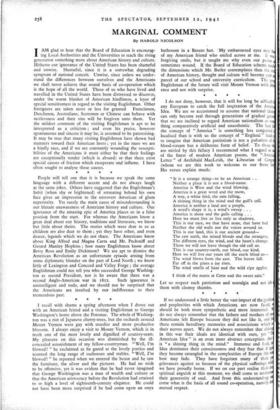I do not deny, however, that it will for long
be aifficult any European to catch the full inspiration of the Amen Idea. We are so accustomed to assume that national icl can only become real through generations of gradual gro that we are inclined to regard American nationalism as thing comparatively artificial and unauthentic. The fact the concept of " America " is something less congenital localised than is with us the concept of " England" leads to imagine that American patriotism is not a pulsation of blood-stream but a deliberate form of belief. To those are misled by this fallacy I recommend what I regard as of the finest of modern American poems, the "Arne Letter" of Archibald MacLeish, the Librarian of Co (whom we are this week to welcome to our front His verses explain much: "It is a strange thing—to be an American. . . Neither a place it is nor a blood-name.
America is West and the wind blowing.
America is a great word and the snow, A way, a white bird, the rain falling, A shining thing in the mind and the gull's call. America is neither a land nor a people,.
A word's shape it is, a wind's sweep . .
America is alone and the gulls calling. . . Here we must live or live only as shadows. This is our race, we that have none, that have had Neither the old walls nor the voices around us. This is our land, this is our ancient ground— The raw earth, the mixed bloods and the strangers, The different eyes, the wind, and the heart's change. These we will not leave though the old call us. This is our country-earth, our blood, our kind. Here we will live our years till the earth blind us— The wind blows from. the east. The leaves fall. Far off in the pines a jay rises.
The wind miens of haze and the wild ripe apples.
I think of the masts at Cette and the sweet rain."
Let us respect such patriotism and nostalgia and not jab them with clumsy thumbs.
* * * *


























 Previous page
Previous page